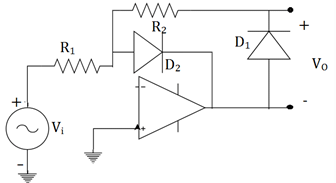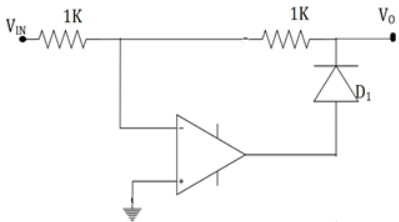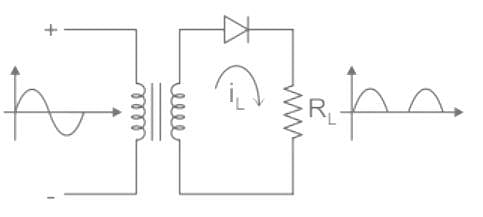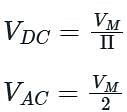Test: Half-Wave & Full-wave Rectifier - UPSC MCQ
20 Questions MCQ Test - Test: Half-Wave & Full-wave Rectifier
The diode in a half wave rectifier has a forward resistance RF. The voltage is Vmsinωt and the load resistance is RL. The DC current is given by _________
The below figure arrives to a conclusion that _________

| 1 Crore+ students have signed up on EduRev. Have you? Download the App |
What is the output as a function of the input voltage (for positive values) for the given figure. Assume it’s an ideal op-amp with zero forward drop (Di=0)

In a half wave rectifier, the sine wave input is 50sin50t. If the load resistance is of 1K, then average DC power output will be?
In a half wave rectifier, the sine wave input is 200sin300t. The average value of output voltage is?
If peak voltage for a half wave rectifier circuit is 5V and diode cut in voltage is 0.7, then peak inverse voltage on diode will be?
Transformer utilisation factor of a half wave rectifier is _________
Ripple factor of a half wave rectifier is_________(Im is the peak current and RL is load resistance)
Efficiency of a centre tapped full wave rectifier is _________
A full wave rectifier supplies a load of 1KΩ. The AC voltage applied to diodes is 220V (rms). If diode resistance is neglected, what is the ripple voltage?
A full wave rectifier delivers 50W to a load of 200Ω. If the ripple factor is 2%, calculate the AC ripple across the load.
A full wave rectifier uses load resistor of 1500Ω. Assume the diodes have Rf=10Ω, Rr=∞. The voltage applied to diode is 30V with a frequency of 50Hz. Calculate the AC power input.
In a centre tapped full wave rectifier, RL=1KΩ and for diode Rf=10Ω. The primary voltage is 800sinωt with transformer turns ratio=2. The ripple factor will be _________
If input frequency is 50Hz for a full wave rectifier, the ripple frequency of it would be _________
Transformer utilization factor of a centre tapped full wave rectifier is_________
In the circuits given below, the correct full wave rectifier is _________
If the peak voltage on a centre tapped full wave rectifier circuit is 5V and diode cut in voltage is 0.7. The peak inverse voltage on diode is_________
In a centre tapped full wave rectifier, the input sine wave is 250sin100t. The output ripple frequency will be _________
Maximum percent rectifier efficiency of half wave rectifier is :





















